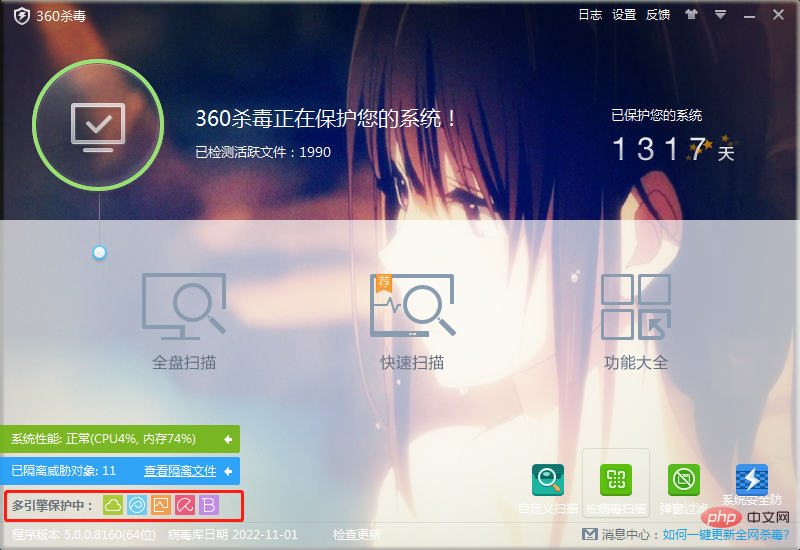Home >Common Problem >What is the difference between 360 Antivirus and 360 Guard?
What is the difference between 360 Antivirus and 360 Guard?
- 青灯夜游Original
- 2022-11-10 16:40:0825633browse
Difference: 1. The main functions are different. 360 Security Guard focuses on killing Trojans, ensuring the user’s computer account, and cleaning up garbage and optimizing acceleration; while 360 Anti-Virus software is for anti-virus. 2. 360 Security Guard has complete self-protection capabilities, but 360 Antivirus software does not. It needs to rely on the self-protection function of 360 Security Guard. 3. 360 Security Guard uses its own engine, while 360 Antivirus software has its own engine and two from other countries (Bitdefender and Avira).

The operating environment of this tutorial: Windows 7 system, 360 Security Guard 13, Dell G3 computer.
What is 360 Security Guard
360 Security Guard is a computer security assistance software launched by Qihoo 360 under Windows, Linux and Mac OS operating systems. 360 Security Guard has multiple functions such as computer physical examination, Trojan detection, system repair, garbage cleaning, optimization acceleration, software housekeeping, etc.
360 Security Guard has created original functions such as "Trojan Firewall" and "360 Encrypted Disk". Relying on preemptive detection and cloud identification, it can comprehensively and intelligently intercept all types of Trojans and protect users' accounts, privacy and other important information. , 360 Security Guard is extremely convenient and practical to use.
What is 360 Antivirus
360 Antivirus is a free cloud security antivirus software produced by 360 Security Center. It innovatively integrates five leading anti-virus engines, including the internationally renowned BitDefender virus anti-virus engine, Avira virus anti-virus engine, 360 cloud anti-virus engine, 360 active defense engine and 360 second-generation QVM artificial intelligence engine. Intelligent engine.
360 Antivirus has the advantages of high killing rate, low resource usage, and rapid upgrade. Zero advertising, zero interruption, zero coercion, one-click scanning, quick and comprehensive diagnosis of system security status and health, and precise repair, bringing a safe, professional, effective, and novel anti-virus protection experience. Its anti-virus capabilities have been recognized by many international authoritative security software evaluation organizations and won multiple international authoritative certifications. According to iResearch data, the number of monthly users of 360 Antivirus has exceeded 370 million, ranking first in the market share of security checking and killing software.
The difference between 360 Antivirus and 360 Defender
1. The main functions of the two software are different:
360 Security Guard focuses on killing Trojans, ensuring users’ computer accounts, and cleaning up junk and optimizing acceleration. The 360 anti-virus software is for anti-virus
2. The technical capabilities are different:
360 Security Guard has complete self-protection capabilities. However, 360 anti-virus software does not have it, and it relies on the self-protection function of 360 Security Guard. If the user does not install Guard, after downloading the anti-virus and installing it, the anti-virus will immediately download the Guard self-protection module in the background. You will see the directory at the same level as the 360sd installation directory. There is an additional 360safe directory.
3. The application engines are different:
360 Security Guard uses its own engine. 360 anti-virus software has its own engines and two from other countries (Bitdefender and Avira).

For more related knowledge, please visit the FAQ column!
The above is the detailed content of What is the difference between 360 Antivirus and 360 Guard?. For more information, please follow other related articles on the PHP Chinese website!

